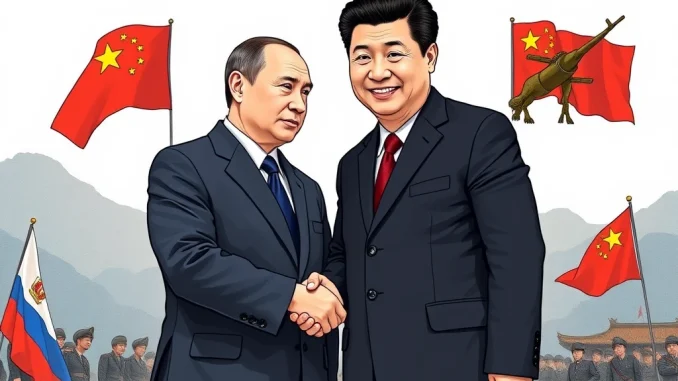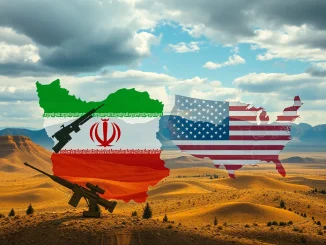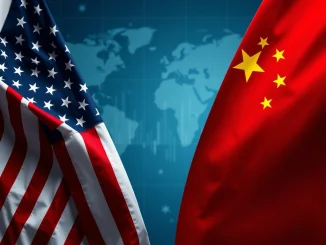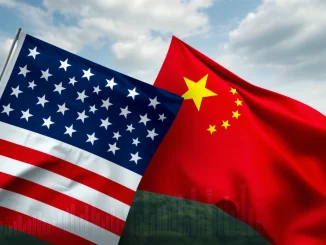
In a world increasingly shaped by geopolitical shifts, a recent declaration from Moscow is sparking conversations far beyond traditional political circles, potentially touching upon the very future of global finance and alternative assets like cryptocurrency. While seemingly distant from the world of digital currencies, major shifts in international relations can ripple through economies and financial systems, prompting a closer look at non-sovereign assets.
What Was Discussed at the Recent Putin Xi Meeting?
According to a report from the South Korean news outlet Maeil Business Newspaper, Russian President Vladimir Putin stated that Russia, in concert with China, intends to counter neo-Nazism and militarism. This announcement followed reports of a smaller, focused meeting between President Putin and Chinese President Xi Jinping held at the Kremlin Palace.
The core message emerging from this Putin Xi meeting centers on a shared commitment to pushing back against forces they perceive as promoting historical revisionism and aggressive military postures. This aligns with both nations’ publicly stated views on certain historical narratives and contemporary global security dynamics.
Understanding the Russia China Alliance‘s Stated Goals
The joint statement about countering neo-Nazism and militarism from the perspective of the Russia China alliance carries significant weight in the context of their growing strategic partnership. For Russia, the term “neo-Nazism” is often used in reference to political movements and historical interpretations in countries like Ukraine. For China, concerns about militarism are frequently linked to regional security dynamics and the actions of other global powers.
This shared language underscores a deeper alignment on certain geopolitical issues and a mutual desire to challenge dominant Western narratives and influence. Key aspects of their perceived shared stance often include:
- Emphasis on multipolarity in global governance.
- Critique of what they view as unilateralism from other nations.
- Promotion of alternative international frameworks and institutions.
- Shared historical perspectives on World War II and its aftermath.
The declaration solidifies the perception of a strengthening Russia China alliance, one that aims to play a more prominent role in shaping the future global order.
How Do Geopolitical Shifts Like This Impact the Global Order?
Major realignments between powerful nations like Russia and China represent significant geopolitical shifts. They challenge the existing structure of the global order that has largely been in place since the end of the Cold War. A stronger axis between these two nations could lead to:
- Increased coordination on international issues, potentially complicating consensus in bodies like the UN.
- Accelerated development of alternative economic and financial systems outside the traditional Western framework.
- Heightened competition and potential friction points with existing alliances and powers.
- A shift in global economic flows and investment patterns.
These geopolitical shifts don’t just impact diplomatic relations; they have tangible effects on global trade, supply chains, currency valuations, and financial stability. It’s in this context that the potential role of alternative assets becomes relevant.
Connecting Geopolitics to the Crypto Landscape
While the Russia China alliance‘s statement didn’t mention cryptocurrency, major developments in international relations and the resulting geopolitical shifts can have indirect but significant impacts on the crypto landscape. Cryptocurrency, by its decentralized nature, exists largely outside traditional, state-controlled financial systems. This characteristic makes it a subject of interest during periods of geopolitical tension or shifts in the global order.
When traditional financial systems face stress due to sanctions, trade wars, or the emergence of new economic blocs, individuals and even entities may look for alternatives. Crypto can be perceived as a hedge against instability or a tool for transactions that might be difficult using traditional rails.
Could This Alliance Accelerate Crypto Adoption?
The strengthening Russia China alliance and their stated aim to counter certain global forces could, theoretically, contribute to conditions that favor crypto adoption, particularly in specific use cases. Here’s how:
- Alternative Payments: If this bloc seeks to reduce reliance on the US dollar or SWIFT, they might explore non-traditional payment methods. While state-backed digital currencies (CBDCs) are a likely primary focus, the underlying technology and the push for digital alternatives could indirectly benefit awareness and infrastructure relevant to decentralized crypto.
- Hedge Against Instability: Increased geopolitical tension stemming from these geopolitical shifts can lead to uncertainty in traditional markets. Some investors view assets like Bitcoin as a form of ‘digital gold’ – a store of value potentially uncorrelated with traditional financial assets and less susceptible to state control or seizure.
- Sanctions Evasion Concerns: Geopolitical friction often leads to sanctions. While regulatory bodies are increasingly monitoring crypto use for sanctions evasion, the potential remains a factor driving some interest in decentralized assets, albeit a controversial one.
- Focus on Digital Sovereignty: Both Russia and China have expressed interest in digital sovereignty. While this primarily manifests in internet control and CBDC development, the broader push towards digital assets outside Western control aligns conceptually with aspects of the crypto ethos, even if their state-controlled approach differs fundamentally from decentralized ideals.
It’s crucial to note that while geopolitical events can *influence* interest and adoption, they also bring risks, including potential regulatory crackdowns aimed at preventing the use of crypto for undesirable purposes.
Challenges and Opportunities for Crypto in a Changing International Relations Environment
The evolving landscape of international relations presents a mixed bag for the crypto world:
Challenges:
- Regulatory Uncertainty: Geopolitical tensions can spur governments to tighten regulations on crypto, fearing its use in illicit activities or capital flight.
- Market Volatility: Major geopolitical events often lead to broad market sell-offs, and crypto is not immune to this, despite the ‘hedge’ narrative.
- State Control vs. Decentralization: The push by major powers towards CBDCs highlights a preference for centralized digital control, which is fundamentally opposed to the decentralized principles of many cryptocurrencies.
Opportunities:
- Increased Awareness: Discussions around alternative financial systems due to geopolitical shifts bring crypto into the conversation for a wider audience.
- Demand for Decentralized Alternatives: If trust in traditional systems or specific national currencies wanes, the appeal of truly decentralized, censorship-resistant assets can grow.
- Innovation in Cross-Border Payments: The need for faster, cheaper, and less controlled cross-border transactions could accelerate the development and adoption of crypto-based payment solutions.
The long-term impact will depend on how these geopolitical shifts play out and how governments and international bodies choose to regulate and interact with the crypto space.
Actionable Insights for the Crypto Enthusiast
For those interested in cryptocurrency, monitoring developments in international relations, particularly regarding the Russia China alliance and other significant geopolitical shifts, is worthwhile. While not directly tied to specific price movements, these macro trends inform the broader environment in which crypto operates.
Consider:
- Understanding the narrative of crypto as a non-sovereign asset and its potential role in different economic and political climates.
- Being aware of potential regulatory responses to geopolitical events that could impact crypto access or use.
- Recognizing that while geopolitical tension can drive interest, it also increases overall market risk.
Staying informed about the evolving global order provides valuable context for the future trajectory of digital assets.
Summary: A Changing World and Its Potential Crypto Ripples
The recent Putin Xi meeting and their pledge to counter neo-Nazism and militarism underscore the strengthening Russia China alliance. This development is a significant data point in the ongoing geopolitical shifts that are reshaping the global order and influencing international relations. While the direct link to cryptocurrency is not explicit, these macro-level changes can create conditions that impact the perception, utility, and adoption of alternative financial systems, including digital assets.
As nations navigate a more multipolar world, the search for financial tools that operate outside traditional control structures may grow. Understanding these complex geopolitical dynamics is key to appreciating the broader context in which the crypto market continues to evolve.



